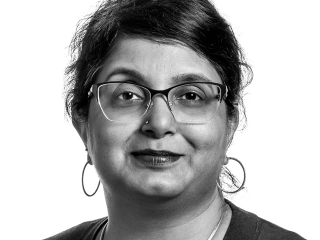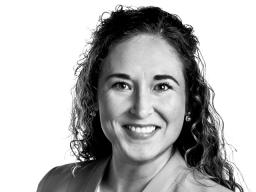
Nina Suresh, PhD
Co-Director, Single Motor Unit Lab
Assistant Professor. Physical Medicine and Rehabilitation, Feinberg School of Medicine
My Lab
Single Motor Unit Laboratory
We record electrical activity from single motor units as well as muscle during voluntary and reflex contractions in patients with neurological disorders.
view labAbout Me
I did my undergraduate in computer science/math and my PhD in Bioengineering a the University of Illinois (Chicago), with advisors Gyan C Agarwal and Gerald L Gottlieb.
My research focus is on investigations of the neural control of muscle, both in neurologically intact individuals as well as in individuals who have suffered a neurological injury, such as stroke or spinal cord injury, with an emphasis on spasticity and weakness in stroke. The goal of my research studies is to derive greater understanding of neurophysiological mechanisms underlying motor impairments following neurological disorders, utilizing novel tools to characterize and assess neurophysiological behavior. In order to understand the intricacies and nuances of motor control, I conduct single motor unit studies using recordings from intramuscular electrodes as well as with novel surface electrode systems combined with surface EMG decomposition algorithms. In addition, I use traditional surface EMG recordings as well as recordings from surface grid electrodes to obtain global information regarding muscle activation. I have also initiated a study to investigate similar issues in the acute stages post-stroke, in an effort to track and understand the development of spasticity. My investigations involve voluntary isometric contractions and/or reflex testing.
With a background in engineering, I also pursue ideas to develop new devices and methods to enable more precise quantification of normal neurological tests , such as the Modified Ashworth Score, in order to provide greater precision in the prescription and application of clinical interventions.
Recently I have started to design and conduct studies that will probe the neuro-muscular recovery following a spinal cord injury, utilizing EMG feedback in one study and quantitatively assessing the effect of functional FES during cycling in another study. In general, this follows my interest in integrating well established experimental methods with inpatient and outpatient therapy and to use these methods to assess therapeutic outcomes as a means to empower both clinicians and patients with greater information.
Location
Shirley Ryan AbilityLab
355 East Erie
Chicago, IL 60611
Education & Training
-
Education
1979 – 1982
B.S, Math and Computer Science, ( summa cum laude ) UIL
1982 – 1989
PhD, Bioengineering, University of Illinois
-
Fellowship
1989 – 1990
Postdoctoral Fellow, Rehabilitation Institute of Chicago
1999 – 2003
Postdoctoral Fellow, Rehabilitation Institute of Chicago
-
Professional Affiliations
IEEE Engineering in Medicine and Biology Society
Society for Neuroscience
Featured Research
Recent Publications
Research Interests
-
Mechanisms of Spasticity and weakness post stroke
-
Precision medicine
-
Acute to chronic changes post stroke
-
Signal analysis (EMG)
-
machine learning algorithms for signal processing
-
device development
-
stroke, spinal cord injury
Grants
-
Tracking the evolution of spasticity in acute strokeAmerican Heart Association
, 2016 - 2019

